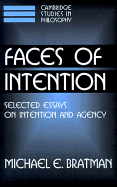Book contents
- Frontmatter
- Contents
- Acknowledgments
- 1 Introduction: Planning Agents in a Social World
- PART ONE ACCEPTANCE AND STABILITY
- PART TWO SHARED AGENCY
- PART THREE RESPONSIBILITY AND IDENTIFICATION
- PART FOUR CRITICAL STUDIES
- 11 Davidson's Theory of Intention
- 12 Castañeda's Theory of Thought and Action
- 13 Cognitivism about Practical Reason
- 14 Review of Korsgaard's The Sources of Normativity
- Index
13 - Cognitivism about Practical Reason
Published online by Cambridge University Press: 18 December 2009
- Frontmatter
- Contents
- Acknowledgments
- 1 Introduction: Planning Agents in a Social World
- PART ONE ACCEPTANCE AND STABILITY
- PART TWO SHARED AGENCY
- PART THREE RESPONSIBILITY AND IDENTIFICATION
- PART FOUR CRITICAL STUDIES
- 11 Davidson's Theory of Intention
- 12 Castañeda's Theory of Thought and Action
- 13 Cognitivism about Practical Reason
- 14 Review of Korsgaard's The Sources of Normativity
- Index
Summary
REASONING: THEORETICAL AND PRACTICAL
In theoretical reasoning our concern is with what to believe, in practical reasoning with what to intend and to do. In the former we are trying to find out how the world is; in the latter we are concerned with how to (try to) change it. These can seem to be two different – though no doubt importantly related – enterprises. J. David Velleman argues otherwise. His view is “that practical reasoning is a kind of theoretical reasoning, and that practical conclusions, or intentions, are the corresponding theoretical conclusions, or beliefs” (p.15). These twin identifications – of practical reasoning with a kind of theoretical reasoning, and of intention with a kind of belief – are at the heart of this wide-ranging, imaginative, and important study of autonomous agency, rationality, and value. Let us call this pair of identifications “cognitivism about practical reason.” Velleman's cognitivism about practical reason lies at the foundations of his book. I want to know if it is defensible.
SPONTANEOUS SELF-KNOWLEDGE
Velleman's route to his main conclusions begins with reflection on the special kind of knowledge and understanding we normally seem to have of our own intentional conduct. When I act intentionally I usually know what I am doing and I usually know at least a rudimentary explanation of why. Further, I seem to know this in a distinctive way. As Velleman puts it, there is a kind of “spontaneity” in my knowledge: I do not need to step back and observe what I do and infer what my motives are in the way you would need to for you to have such knowledge about me.
- Type
- Chapter
- Information
- Faces of IntentionSelected Essays on Intention and Agency, pp. 250 - 264Publisher: Cambridge University PressPrint publication year: 1999
- 4
- Cited by



